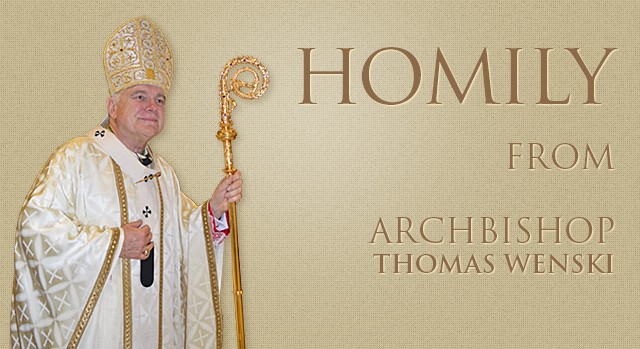By Archbishop Thomas Wenski - The Archdiocese of Miami
Archbishop Thomas Wenski preached this homily Sept. 20, 2018, during the final Mass with archdiocesan priests gathered for their annual convocation, Sept. 18-20, 2018, at the Hilton Miami Downtown.
Each of the four Gospels has an account of the washing of Jesus' feet by a woman. Scripture scholars would agree that the accounts of Matthew, Mark and John are essentially about the same incident. Luke's account (Luke 7: 36-50), however, is significantly different so that many authorities would hold that what we have heard in Luke's account is unique, found only in Luke.
The story is touching in its drama. Three characters are involved: Jesus, Simon the Pharisee and the unnamed woman with a soiled reputation.
And I think, if we were to ask the unchurched how they perceive us, the Church � and Christians in general � they would describe us in ways that would have us looking like Simon the Pharisee. And if the unnamed woman in the story saw Simon in the same way as the unchurched often see us, you can imagine how difficult it had to be for her to endure the nasty looks of Simon and those with him in order to meet Jesus.
But it apparently was worth it for her. She had � in spite of her sins � great faith. And � praise God � haven't we all seen people who have had reason to be turned off by actions of the Church leaders or just turned away by pew-sitters but in spite of it � in spite of us � all still seek out Jesus?
We see in these people expressions of faith � like the faith of this unnamed woman � that should put us to shame; for what we wouldn't do for Jesus, they do. It was Simon's house � so you would expect that he had at hand a basin, water and a towel to wash and dry Jesus' dusty feet. Yet he didn't. What we heard in Luke suggests that the woman came to do something additional to what Jesus should have expected of Simon � to perfume Jesus' feet after Simon's people had washed them.
She is a sinner � a hardened woman. Such women do not cry easily. But tears flow � and with such abundance they supply the water and her long hair (perhaps the mark of her trade) supplies for the towel. A great sinner, Simon thinks (and remember that to the unchurched he resembles us, and so likewise they feel themselves to be judged by us). But Jesus tells Simon � she sinned much, you say? I say she loved even more. And maybe in telling Simon this he also wants for us to rid ourselves of those ways we judge and think that give rise to those perceptions that the unchurched have about us.
Too often, before we help somebody, we first want to judge them. Like sometimes you hear people say, Oh, I want to help the poor � the “worthy” poor. And we use that as an excuse to ignore those we might deem “unworthy” of our efforts. But, as Mother Teresa used to say, “If you judge people, you have no time to love them.”
Unlike Simon, Jesus did not feel that to be holy � to be clean � meant to distance himself from sinners. Jesus didn't mind the smell of the sheep; he didn't even mind having his feet scented with the perfume of a harlot.
Jesus had something to say to Simon. Does he have something to say to us?

